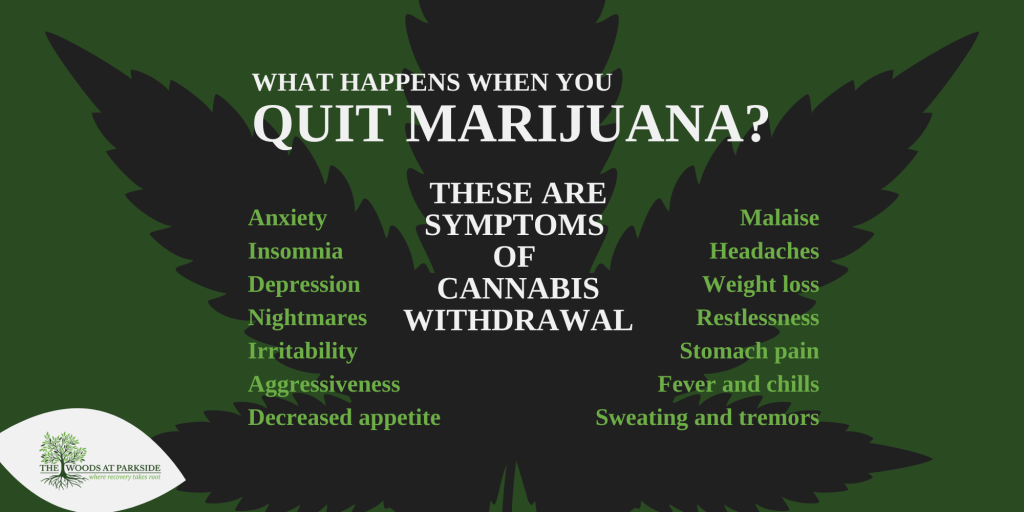
Have you wondered, “Is marijuana addictive?” If so, you are not alone. However, although someone may be more likely to get addicted to alcohol, cocaine, and other highly addictive drugs, it is possible to suffer from a cannabis use disorder.
Here, we will explore what you need to know about cannabis use disorders, including marijuana cravings, marijuana dependence, cannabis addiction, and marijuana withdrawals. Finally, you can learn how to recognize when it is time to seek professional help for overcoming addiction.
Is your marijuana use becoming a problem? Seek help now by contacting The Woods at Parkside.
Table of Contents
Is Marijuana Addictive?

The question of whether marijuana is addictive has been debated for years. Proponents of cannabis use tend to say that marijuana is a non-addictive substance with many benefits. However, most medical experts agree that marijuana can indeed be addictive, at least for some people and in certain circumstances.
In fact, according to the CDC, anyone who uses cannabis has a 10% chance of becoming addicted. In another study, 3 out of every 10 people who used marijuana had a cannabis use disorder. So, what is marijuana addiction, and is it different from cannabis use disorder? Here are some facts to help you understand.
Cannabis Use Disorders vs. Marijuana Addiction
The term “cannabis use disorder” is often used synonymously with “marijuana addiction.” If you look at the DSM-5, the reference doctors use to diagnose mental disorders, you will see something interesting. That is, the same 11 symptoms of cannabis use disorders are the same as the 11 symptoms used for other substance use disorders or addictions.
Marijuana Dependence vs. Addiction
While there are varying levels of severity for cannabis use disorders, they all involve being dependent to some degree on marijuana. What does it mean to be dependent? When you are dependent on a substance, even if it is marijuana, it is difficult for you to go without it or stop using it.
Scientists generally prefer the term “Cannabis Use Disorder” (CUD). However, many people still use terms like addiction and dependence. Dependence usually refers to the physical aspects of substance use disorders. So, you are dependent on cannabis if you build up a tolerance or have withdrawals when you go without it. Is marijuana addictive? While the term “addictive” may be controversial, it is certain that people can become dependent on cannabis.
Many people see addiction as something more related to the behaviors that go along with these physical changes. As the biochemical nature of your brain changes, it affects your behavior, making cannabis use your top priority. Because of this, you behave in ways that are irrational unless viewed as a means to get the substance.
Is Marijuana Addictive Physically or Psychologically?
The previous section talked about dependence, which is a physical problem, and addiction, which is a psychological issue. The question is, does marijuana fit into both categories? The answer is yes. Marijuana use disorders do have a physical aspect of dependence as well as a psychological component. The National Institute on Drug Abuse (NIDA) states that severe cases of cannabis use disorder are addictions.
The physical part of addiction includes physiological changes that happen in your brain over time as you continue to use marijuana. For instance, you may become irritable, restless, lose your appetite or have cravings, or feel physically uncomfortable when you try to quit. These symptoms can last two weeks as your body and brain adapt to their new state without marijuana.
You can also become tolerant to addictive substances. That is, the longer you use them, the more you need to use them to get the same effect. This is true of marijuana for many people.
Why does it happen? Your brain has gotten so used to the drug that it has changed. The endocannabinoid neurotransmitters that naturally exist in your brain have stopped working as well. Your brain is no longer sensitive to these neurotransmitters, so when you are no longer feeding your brain with marijuana, your brain feels the loss even more.
Psychological addiction happens when you let these physical changes determine how you live your life. Even when getting or using cannabis causes damage to your relationships, results in legal issues, or lowers your work performance, you continue to use it to satisfy your psychological feeling of need for it.
What Are Marijuana Withdrawals Like?

Suppose you use marijuana nearly every day. What will happen if you quit? Unfortunately, you will likely have marijuana withdrawals. When you are going through marijuana withdrawals, you will feel physically and emotionally uncomfortable. You may experience any of the following symptoms.
- Feeling angry, irritable, or aggressive
- Nervousness or anxiety
- Insomnia
- Strange dreams or nightmares
- Decreased appetite with or without weight loss
- Restlessness
- Malaise
- Depressed feeling
- Gastrointestinal pain
- Fever
- Chills
- Headache
- Sweating
- Tremors
While marijuana withdrawals may not seem as severe as those with a drug like heroin, cocaine, meth, or even alcohol, they are still extremely uncomfortable. That is why quitting marijuana with help at a facility like The Woods at Parkside can be much more successful. You have doctors, nurses, and therapists to help you get through the worst of the symptoms, which should get better within a week or two.
Signs of Problematic Marijuana Use
The signs of problematic marijuana use are the same as the signs of any substance use disorder. The DSM-5 lists 11 signs of marijuana addiction that doctors watch for when diagnosing cannabis use disorder.
- Losing control of use – using more than you intended to
- Social problems – not getting engaged with work, relationships, social events, or recreational pursuits because of cannabis use
- Unable to stop – you want to quit, but when you try, you find that you cannot do it
- Risky behavior – continuing to use marijuana even when it puts you in danger
- Cravings – having an urge to use whenever you are not using it
- Marijuana use is making other physical and psychological issues worse
- Poor performance at work, home, or school
- Becoming tolerant to marijuana so that you need more to get the effect you want
- Ignoring the problems that come with cannabis use
- Withdrawal symptoms coming up whenever you go without marijuana
- Putting way too much time, attention, and resources toward marijuana use
Suppose you suspect someone close to you has a marijuana addiction. In that case, you might notice several symptoms in their appearance and behavior. Their eyes may be red, they eat often, their performance at work and school is worse than usual, they withdraw from others, and they spend time with people who use drugs. They may buy bongs or rolling papers, do online research about marijuana, and use a lot of slang related to marijuana and other drugs.
Yet, how do you talk to someone with an addiction? Learning about marijuana addiction is the first step. Then, you can listen to them and support their recovery efforts.
Seeking Professional Help
If you realize that some or all of these symptoms describe your cannabis use, you may have a cannabis use disorder. It can be frightening or disturbing to think that what you thought was a fun, recreational activity has become an addiction. Yet, you are not alone. There is help available to you. Seeking professional help is the best thing you can do if your marijuana use is interfering with your life.
When to Ask for Help with Problematic Marijuana Use
There is nothing wrong with asking for help with problematic marijuana use. In fact, it could improve your life in many ways. You may become happier, more productive, and more successful. Your social life could improve, and you may find that you can enjoy your life even more when you are not always focused on getting your next high.
Anytime the symptoms of marijuana use have become uncontrollable, it makes sense to talk to a professional. When marijuana use affects the main activities in your life, asking for help can change everything. You can get your life back and be free of addictive behaviors, perhaps for the first time in months or years.
Where to Go for Cannabis Use Disorder Treatment
At The Woods at Parkside, we treat cannabis use disorders in people from Central and Southern Ohio and nearby areas. From the initial marijuana withdrawals to dealing with the fallout of cannabis use, our doctors and therapists can make this journey more comfortable and effective.
At our beautiful facility, we have 50 residential beds, detox services, and longer-term programs to help you get back to a drug-free life. With our residential program, day treatment, and intensive outpatient care all available, you have many options. You can overcome cannabis use disorders with the help you need. Our primary mission is to help you recover from addiction and manage other mental health issues. Why wait until cannabis use cause lasting damage to your health, work, and relationships? Talk to a professional at The Woods at Parkside today.
Would you like help to get past a marijuana addiction? Talk to our addiction recovery team at The Woods at Parkside now.
The post Is Marijuana Addictive? Understanding Cannabis Use Disorders appeared first on The Woods At Parkside.
Source
Original Author: Beacon User

